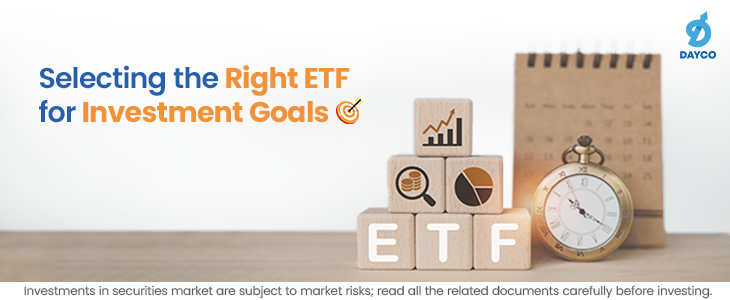Exchange Traded Funds (ETFs) are like a one-stop shop for investing, making it easy and affordable to invest in a diversified basket of securities. As more people get interested in ETFs, it’s important to know how to pick the right one for your goals. In this piece, we try to break down ETF investing for you.
Now, before learning about how to choose an ETF for beginners, let’s talk about passive investing. Passive investing is about following an index– no active buy/sell decisions are taken by the investor. Passive investing can be achieved through vehicles like index funds or ETFs. These vehicles follow a ready-made index– like NIFTY50 or SENSEX. Fund manager’s role is limited and the objective is to keep the portfolio identical to the index it is following. This approach is great for folks who want a hands-off approach, especially if you’re not into picking individual stocks or bonds and perfect for long-term goals like saving up for retirement. It’s a low-maintenance strategy and if you are not the type to obsessively check the stock market every five minutes – passive investing could be your thing.
It’s important to remember that passive investments aren’t immune to market twists and turns. Keep it real with your expectations. It’s all about the long game, not those quick, flashy wins.
What To Consider When Choosing An ETF?
Trading Volumes
One of the main advantages of ETFs is their ability to trade like stocks on a stock exchange. However, this depends on the trading volumes of the ETF. Consistent trading volumes means tighter bid-ask spreads, which means you can buy or sell shares at a better price. Before investing, research the ETF’s trading volumes and look for any trends that might indicate declining interest. Steady or increasing trading volumes are generally positive indicators of an ETF’s liquidity. Also, ETFs with larger fund sizes often indicate higher investor interest. This can lead to better liquidity, narrower bid-ask spreads, and lower trading costs for you. A larger fund is more likely to attract institutional investors and can help you avoid the risk of investing in an illiquid ETF.
Tracking Difference and Tracking Error
When you invest in an ETF that tracks a specific index, you want its returns to closely mirror the performance of that index. However, trading costs, issues purchasing/selling the underlying, cash balance, corporate actions, etc. can cause variations in returns between the ETF and the index. This discrepancy is known as tracking difference and the volatility in tracking difference is tracked via tracking error. Lower tracking difference and tracking error indicates that the ETF’s returns closely align with the index’s returns. When selecting an ETF, opt for one with a history of consistently low tracking difference, as it indicates effective management. Here, the age of the ETF is also important as new or recent ETFs have limited historical data to assess their tracking difference and error accurately. It’s wise to consider ETFs that have been around for a few years, as this provides a more reliable track record to evaluate.
Costs
Costs play a crucial role in investing success. ETFs are generally more cost-effective than actively managed funds due to their passive nature. The expense ratio, which covers administrative costs, is typically lower in ETFs. However, even among ETFs, expense ratios can vary. When comparing similar-quality ETFs, opt for the one with the lowest expense ratio. Remember, every rupee saved on expenses is an additional rupee contributing to your overall returns.
ETFs can be powerful tools in achieving your financial goals, but conducting thorough research is essential. As you navigate the vast landscape of ETF options, remember to prioritize factors like trading volumes, tracking difference, tracking error, and costs. By making informed decisions, you can harness the potential of ETFs to enhance your investment journey and work towards your financial aspirations.
If you have a question, share it in the comments below or DM us or call us – +91 9051052222. We’ll be happy to answer it.
~Nischay Avichal
















